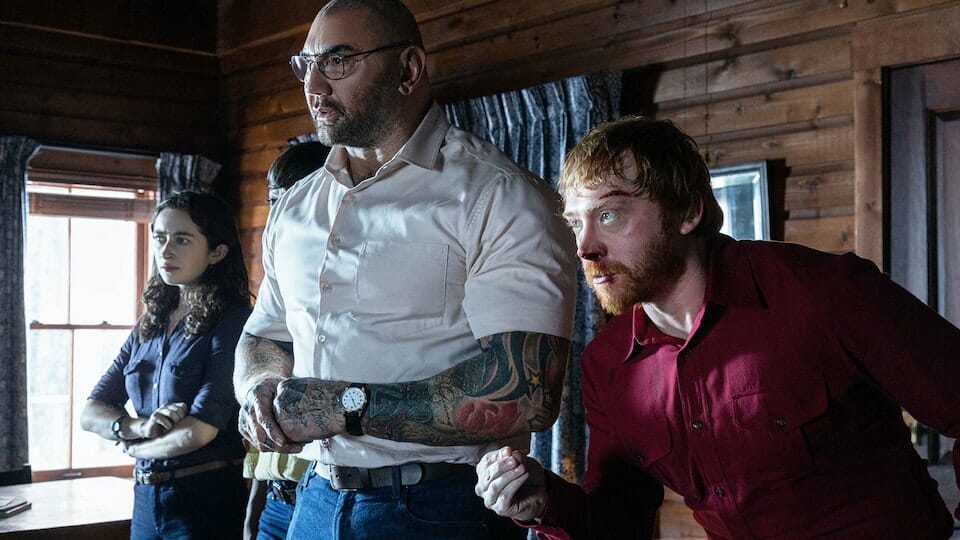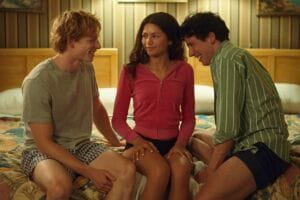The book on which Knock at the Cabin is based is like M. Night Shyamalan catnip. A family-centric horror thriller with supernatural overtones and faith in the power of love—throw in a twist and you’ve got half of M. Night’s filmography. Knock at the Cabin, surprisingly, forgoes the twist route; Shyamalan has said that he’s aiming for ambiguity with this story. There are no late-game curveballs this time around—unless you were expecting to be satisfied by the end. Or for Shyamalan to achieve genuine ambiguity.
READ ALSO: Read all of Ryan Bordow’s movie reviews here
READ ALSO: Here’s how Arizona film incentives could attract filmmakers
The film follows a family of three, a couple and their daughter, trapped inside their vacation cabin by a team of cultish strangers. The intruders claim to have seen visions of an imminent apocalypse only avertible by a particular human sacrifice: that of one family member at the hand of another. The strangers, wholly bought into the delusion, refuse to leave until the family chooses who to kill. Their pleas to ruin vacation at first fall on deaf ears, but tragedies ensue on the news each time the family denies them. Is it an elaborate ruse, or are the intruders truly prophets? It’s ambiguous, maybe!
Corners of the cultural conversation have sought to rethrone Shyamalan in recent years, and not for no reason: his work blends B-movie pleasures, high-concept theatrics, and intense emotional earnestness in proportions perfect for when popcorn runneth over. But his “renaissance” films—The Visit, Split, Glass, Old—are still clunky reconstructions of his once-winning formula, largely due to underthought, overwritten scripts. With Knock at the Cabin, Shyamalan shares screenplay credit for the second time in his career, but the film is still replete with his signature weaknesses. It even opens on one of his worst tendencies: a hyper-precocious child.
Shyamalan kids speak and act like an unholy fusion of child and middle-aged screenwriter, and Wen, the couple’s adopted daughter, is no exception. She’s out collecting grasshoppers and spouting grating lines to herself when head intruder Leonard (Dave Bautista) approaches to try to befriend her. Their conversation is meant to endear us to Wen and kick off the tension, but Wen isn’t endearing because she talks like an infant chatbot, and the scene isn’t tense because the camera’s trying to force it. The shot/reverse shot between Wen and Leonard’s faces is framed in constant canted close-ups, which at the very start of the film feels desperate to set a mood. From dialogue to cinematography, Knock at the Cabin reeks of a heavy hand.
The film is dotted with inspired visual choices—unusual camera placements, lots of off-screen action and dialogue—but inspiration doesn’t guarantee flow (or nice composition, for that matter). Conjoined with Shyamalan’s amateurish, over-mannered dialogue, the visual language comes off the same. And the dialogue sure is rough, swiveling between unfunny gags, truisms disguised as profundities, and plot hole-peppered nonsense at any moment’s notice. The news reports of catastrophes are especially asinine—Shyamalan and co. appear to have scant understanding of how reporting works, or how quickly news travels, or how human beings might respond to the literal apocalypse. Worst of all is how thinly the family is sketched: the couple barely registers beyond their queerness, reducing the possibility of their deaths to purely conceptual stakes. The trolley problem isn’t so bad when mere symbols are tied to the tracks.
Still, the script benefits from the novel’s ambiguity, which the performances do well not to betray. There are fertile themes at play: how we use religion to rationalize suffering, for one, or whether faith is reducible to unconscious cost-benefit analysis. The lack of answers keeps the metaphysical questions alive.
But then the script deviates from the book.
In its final act, Knock at the Cabin veers so hard into certainty that its subtext just bottoms out. It’s a bewildering betrayal of what works about the story. By doling out answers where the book stayed mum (among other ill-advised changes), the script flattens its themes of faith, love, and suffering—all of which are thornier in the presence of uncertainty—into a less-than-hypothetical “would you rather?” scenario. It eschews ideas for rote drama. Where the novel leaves the big stuff ambiguous, opening every climactic decision to interpretation, the film merely hands its (boring) characters a bittersweet finale. Ambiguous feeling is not ambiguous thinking, and one is rarely interesting without the other.
By the tonally confused ending, there’s little to sink your brain’s teeth into. And thanks to the workmanlike character writing, there’s also little to take to heart. Given Shyamalan’s gifts, that’s all the more disappointing.
★ (1/5)




